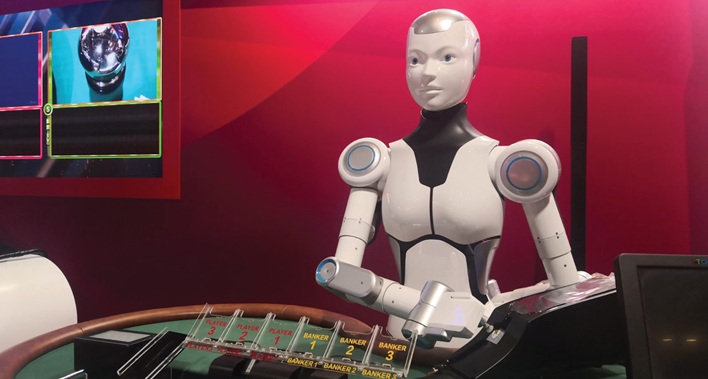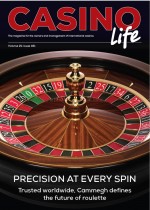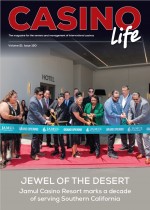'Beyond the Perfect Smile' By Mark McGuinness
WE have mastered the aesthetics of live gaming, streaming flawless videos of professionally trained croupiers with impeccable whiter-than-white smiles. Yet beneath this polished veneer lies a hollow truth: a relentless churn of players moving from one bonus to the next.
The industry's obsession with transactional acquisition has created a lonely experience. The only sustainable future lies in building genuine communities and fostering the emotional relevance that turns a solitary bet into a shared adventure. Isn’t that what a land-based casino is all about: the atmosphere, emotional thrill and energy?
A Hollywood Masterpiece
Log on to any virtual casino floor today and what do you see? You see professionalism. You know that feeling when you walk into a party that looks perfect, but the atmosphere is completely dead? That’s what I get from live casinos today. I see the polished studios and the perfectly presented croupiers.
The technology is seamless, the streaming is crisp, and the whole thing runs like a Swiss watch. It is, without a doubt, a masterpiece of a Hollywood-scale production. However, if you look closely beyond the veneer and stereotypes of the smile and the spin, isn’t there a subtle, creeping emptiness to it all?
For too long, the industry has focused on the mechanics of acquisition and retention, often forgetting the human element that makes gaming compelling in the first place. We have built a magnificent revolving door. We entice players with generous, almost desperate, welcome bonuses. They come in, they play, they burn through the bonus. Then they are gone, lured away by the next, even shinier, offer from a competitor.
This constant churn is not only expensive but also exhausting. It is a business model built on a perpetual sugar rush, a short-term high that inevitably leads to a crash. We are playing with fire, assuming an endless supply of new players will walk through that door, without ever asking ourselves why the old ones keep leaving.
A Solitary Experience
The fundamental problem is that we have created a transactional environment rather than a relational one. A player logs in, places a bet and logs out. They might be sitting at a virtual blackjack table with six other avatars but are they truly playing with them? Or are they just six solitary individuals sharing the same digital real estate? Are they human? The experience is often very isolating.
Let's talk about the chat boxes! If you can even call them that. Most of them are spammed with auto-responses. The human interaction is zero. And the dealers? They’re professional, absolutely. But it’s a scripted professionalism. They’re trained to be pleasant, not to be too real. There’s no genuine warmth, no real connection. We’ve become so obsessed with perfecting the science of the game that we've completely forgotten the art of the gathering. I must ask: How long can we really keep this up?
Where the Future Lies
The future, the real, profitable and sustainable future of live gaming does not lie in another zero, multiplier or bonus offer, or a fractional improvement in streaming latency. It lies in building communities. It lies in creating spaces where players feel they belong, where their presence is valued beyond their wallet share and where the experience itself is the primary reward. The future is about shared play and fostering profound emotional relevance.
Let us be clear. Emotional relevance is not about contrived sentimentality. It’s about creating a genuine sense of camaraderie, shared purpose,and a collective experience. Think about the irresistible pull of a local pub quiz. People do not go just for the chance to win a £20 bar tab; indeed, in my local, they don’t. They go for the banter, the friendly rivalry, the shared groans at a tricky question, and the collective cheer of a correct answer. They go to be part of something. Why has the online gaming world, with all its technological prowess, struggled so profoundly to replicate this basic human need?

Genuinely Phony
The answer is that we have been trying to automate authenticity. We have viewed players as data points on a spreadsheet rather than as people seeking entertainment and connection. The antidote to this cold, clinical approach is not another algorithm. It is a person. Specifically, it is the co-creator.
The term ‘influencer’ feels too corporate and one-dimensional. A co-creator, on the other hand, is a partner in building the experience. These are the charismatic streamers, the natural hosts and the trusted personalities who have already built the very thing the industry so desperately needs: an engaged, loyal community. They are not just advertisers. They are the human bridge between a corporate brand and a real, breathing audience. They are the pub-quiz hosts for the digital age.
Dismissing this as a niche marketing tactic is a profound mistake. The numbers tell a story of incredible potential. Consider a hypothetical but entirely realistic co-creator we will call ‘Casino Chris.’ Chris streams his live casino play three nights a week on Twitch and YouTube. He has a combined following of 300,000 subscribers. This is not a colossal, movie star-sized audience. It is a dedicated, highly engaged community. His core demographic is 25-to-45-year-olds, people with disposable income who view gaming as a primary form of entertainment, not a desperate get-rich-quick scheme.
The Linchpin
Now for the crucial part. The average engagement rate for a standard digital ad campaign typically struggles to exceed one percent. It is a passive, often-ignored medium. Chris, during a sponsored stream on a branded table, consistently achieves an engagement rate of over seven percent. But what does that engagement look like? It is not a passive click. Thousands of people actively participate in the chat, using custom emojis, cheering for Chris when he wins and commiserating when he loses.
These people are not just watching a game; they are part of a shared story unfolding in real time. They trust Chris’s judgement. When he says a platform is fun and fair, his community listens in a way they never would to a banner ad.
Integrating a co-creator is not about simply slapping a logo on their stream. It is about building something together. Imagine a dedicated ‘Chris's Crew’ blackjack table hosted by him every Friday night. This is not just another live table; it is an event. It is a place for his community to gather.
The operator can take this further. What about a ‘Community Chest’ side bet where, if the host hits a specific outcome, everyone playing at the table wins a small bonus? This transforms the game from a ‘me versus the house’ scenario into an ‘us against the house’ adventure. It creates a team dynamic. It fosters a collective emotional investment that no deposit match could ever buy.
Thinking Emotionally
For me, this is where the emotional strategy clicks into place and directly tackles the churn that marketing teams all complain about! When a player logs on to join a streamer they follow, their motivation and mindset undergo a complete change. They now have a reason to return, a reason which isn't a draconian bonus code but the promise of being part of that community again.
In essence, we're helping them find their virtual pub. This creates the kind of robust, durable connection that translates into genuine long-term value. The bonus might have been the initial hook but it’s the community that will make them stay. This is the evolution from the Wild West of pure technological innovation, where we simply added more games and faster speeds, into a more mature, experience-focused era. It requires a shift in mindset from the top down. We must stop seeing players as mere users to be monetized and start seeing
them as community members to be engaged and entertained. We must have the courage to invest in people, in personalities and in the beautifully messy, unpredictable, and powerful force of human connection.
No Place Like Home
The path forward demands that we ask different questions. Instead of asking, ‘How can we get more players?’, we should be asking, ‘How can we give our players more reasons to love being here?’ Instead of ‘What is the maximum bonus we can offer?’, we should ask, ‘What is the most exciting, shared experience we can create?’ The technology is already here. The platforms are robust. The final missing piece of the puzzle is putting the soul back into live gaming. By embracing shared play and placing authentic, human connection at the heart of our strategy, we can build a future for live gaming that is not only more profitable and sustainable but also infinitely more fun.
We can build brands that people are proud to play with and communities that stand the test of time. The house, after all, does not always have to feel lonely. It can – and should – feel like home.
 Mark McGuinness is a global marketing executive with 20-plus years’ experience in Web3, iGaming, and crypto. As CMO of Devilfish.com, he pioneers community-led growth, integrating NFTs and decentralized tech to reshape social poker through Digital Avatars, co-creation, and microtransactions for the next generation of free-to-play players.
Mark McGuinness is a global marketing executive with 20-plus years’ experience in Web3, iGaming, and crypto. As CMO of Devilfish.com, he pioneers community-led growth, integrating NFTs and decentralized tech to reshape social poker through Digital Avatars, co-creation, and microtransactions for the next generation of free-to-play players.

































